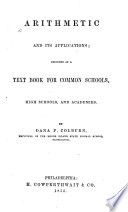 | Dana Pond Colburn - Arithmetic - 1855 - 396 pages
...obtained by dividing the product of the extremes by the other mean. (5.) Hence, in a proportion — The product of the means is equal to the product of the extremes. 161. Practical Problems. (a.) The forming of a proportion from the conditions of a problem is called... | |
 | Thomas Sherwin - Algebra - 1855 - 262 pages
...d, we have ad=bc. But a and d are the extremes, and 6 and c are the means. Hence, In any proportion, the product of the means is equal to the product of the extremes. (п). Suppose we have the equation ad=bc. If we divide both members by b and d, we have — = —,... | |
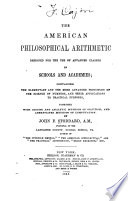 | John Fair Stoddard - Arithmetic - 1856 - 312 pages
...obtained, by dividing the fourth term by the third, we can readily deduce the following PROPOSITIONS. 1. The product of the means is equal to the product of the extremes. Therefore, 2. If the product of the means be divided by one extreme, the quotient will be the other... | |
 | Dana Pond Colburn - Arithmetic - 1856 - 392 pages
...obtained by dividing the product of the extremes by the other mean. (b.) Hence, in a proportion — The product of the means is equal to the product of the extremes. 161 • Practical Problems. (a.) The forming of a proportion from the conditions of a probiem is called... | |
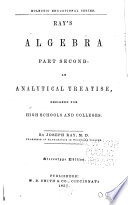 | Joseph Ray - Algebra - 1857 - 408 pages
...second, which fulfills the first condition. Then, 3a:+9 : 5x+9 : : 6 : 7. But in every proportion, the product of the means is equal to the product of the extremes. (Arith. Part 3rd, Art. 209.) Hence, 6(5a:+ff)=7(3z+9). 30a+54=21 x+63, 30a:—21a;=63—54, 9*=9, x=l,... | |
 | Education - 1858 - 596 pages
...more singular still, we are told that the hitherto well-established principle, " In any proportion the product of the means is equal to the product of the extremes, is not true when the terms are denominate numbers ; thus in the proportion 4pk. : 5pk.r= $12 : $15,... | |
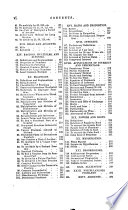 | Dana Pond Colburn - 1858 - 288 pages
...quotient obtained by dividing the product of the extremes by the other mean. (k.) Hence, in a proportion, the product of the means is equal to the product of the extremes. 105. Problems in Proportion. NOTE.— These problems may be solved by analysis instead of proportion,... | |
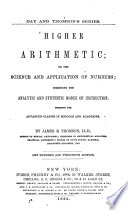 | James Bates Thomson - Arithmetic - 1860 - 440 pages
...terms, the work is right. (Art. 500.) Demtrmtral'ian. -If four numbers are proportional, we have seen that the product of the means is equal to the product of the extremes ; (Art. 498 ;) therefore the priduct of the second and thin/ terms must be equal to that of the first... | |
 | James Bates Thomson - Arithmetic - 1860 - 402 pages
...reason that dividing the product of the second and third terms by the flrst,gives the answer, is because the product of the means is equal to the product of the extremes ; and if the product of two numbers is divided by one of the numbers, the quotient will be the uther... | |
 | Charles Davies - Algebra - 1860 - 332 pages
...(1.) ac Clearing of fractions, we have, bc = ad (2.) Hence, 1 . If four quantities are in proportion, the product of the means is equal to the product of the extremes. Conversely, if we divide both members of ( 2 ) by ca, we shall have, - — - ; or, a : b : : c : d.... | |
| |